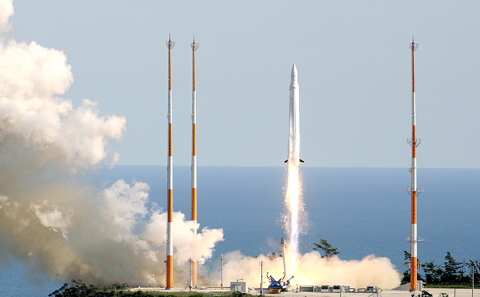South Korea’s first space rocket blasted off yesterday, less than a week after a launch was aborted at the last minute, but it failed to place a satellite into the designated orbit.
The launch, dubbed a partial success by officials, came less than five months after nuclear-armed rival North Korea incurred international anger by firing its own long-range rocket.
Seoul’s Korea Space Launch Vehicle-1 lifted off on schedule at 5pm atop a tail of flame, to the jubilation of officials and guests at the Naro Space Centre.

PHOTO: REUTERS
The Russian-made first stage separated successfully less than five minutes later and the South Korean-built 100kg scientific research satellite was then placed into Earth orbit.
But Science and Technology Minister Ahn Byong-Man said it was not following the designated track.
“All aspects of the launch were normal, but the satellite exceeded its planned orbit and reached an altitude of 360km,” Ahn said.
It should have separated at around 302km.
“A joint probe is under way by South Korean and Russian engineers to find the exact cause,” the minister said.
Korea Aerospace Research Institute head Lee Joo-jin told reporters it was too early to say whether the space center would be able to communicate with the satellite.
Asked if the launch should be seen as a success or failure, Lee said: “We can say it is partially successful, although we have yet to analyze data precisely.”
The satellite’s first signal had originally been expected to come 12 or 13 hours after lift-off.
North Korea, smarting at UN Security Council censure of its April 5 blast-off, had vowed to closely monitor reaction to its neighbor’s launch from Goheung on the south coast.
Pyongyang said it merely put a peaceful communications satellite into orbit and it wants Seoul’s launch also to be referred to the council.
Washington and its allies have said no North Korean satellite was detected in orbit and its launch was in fact a disguised test of a Taepodong-2 missile.
The US State Department said last week that South Korea — in contrast to the North — had developed its program transparently and in keeping with international agreements.
A 2001 accord with Washington bars Seoul from developing missiles with a range of more than 300km.
The launch follows seven delays since 2005. Last week a software problem halted the countdown with just eight minutes to go.
Television showed about 100 invited guests led by South Korean Prime Minister Han Seung-soo applauding and shaking hands after the initial announcement that the satellite was successfully placed into orbit.
They were visibly disappointed when the science minister later announced the hitch.

Kehinde Sanni spends his days smoothing out dents and repainting scratched bumpers in a modest autobody shop in Lagos. He has never left Nigeria, yet he speaks glowingly of Burkina Faso military leader Ibrahim Traore. “Nigeria needs someone like Ibrahim Traore of Burkina Faso. He is doing well for his country,” Sanni said. His admiration is shaped by a steady stream of viral videos, memes and social media posts — many misleading or outright false — portraying Traore as a fearless reformer who defied Western powers and reclaimed his country’s dignity. The Burkinabe strongman swept into power following a coup in September 2022

‘FRAGMENTING’: British politics have for a long time been dominated by the Labor Party and the Tories, but polls suggest that Reform now poses a significant challenge Hard-right upstarts Reform UK snatched a parliamentary seat from British Prime Minister Keir Starmer’s Labor Party yesterday in local elections that dealt a blow to the UK’s two establishment parties. Reform, led by anti-immigrant firebrand Nigel Farage, won the by-election in Runcorn and Helsby in northwest England by just six votes, as it picked up gains in other localities, including one mayoralty. The group’s strong showing continues momentum it built up at last year’s general election and appears to confirm a trend that the UK is entering an era of multi-party politics. “For the movement, for the party it’s a very, very big

ENTERTAINMENT: Rio officials have a history of organizing massive concerts on Copacabana Beach, with Madonna’s show drawing about 1.6 million fans last year Lady Gaga on Saturday night gave a free concert in front of 2 million fans who poured onto Copacabana Beach in Rio de Janeiro for the biggest show of her career. “Tonight, we’re making history... Thank you for making history with me,” Lady Gaga told a screaming crowd. The Mother Monster, as she is known, started the show at about 10:10pm local time with her 2011 song Bloody Mary. Cries of joy rose from the tightly packed fans who sang and danced shoulder-to-shoulder on the vast stretch of sand. Concert organizers said 2.1 million people attended the show. Lady Gaga

SUPPORT: The Australian prime minister promised to back Kyiv against Russia’s invasion, saying: ‘That’s my government’s position. It was yesterday. It still is’ Left-leaning Australian Prime Minister Anthony Albanese yesterday basked in his landslide election win, promising a “disciplined, orderly” government to confront cost-of-living pain and tariff turmoil. People clapped as the 62-year-old and his fiancee, Jodie Haydon, who visited his old inner Sydney haunt, Cafe Italia, surrounded by a crowd of jostling photographers and journalists. Albanese’s Labor Party is on course to win at least 83 seats in the 150-member parliament, partial results showed. Opposition leader Peter Dutton’s conservative Liberal-National coalition had just 38 seats, and other parties 12. Another 17 seats were still in doubt. “We will be a disciplined, orderly